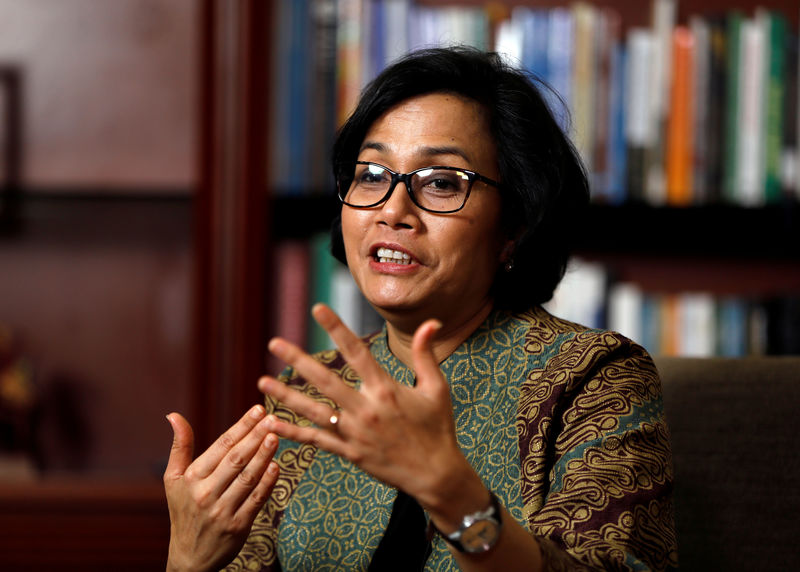 © Reuters. Indonesian Finance Minister Sri Mulyani Indrawati gestures during an interview with Reuters at the Finance Ministry in Jakarta
© Reuters. Indonesian Finance Minister Sri Mulyani Indrawati gestures during an interview with Reuters at the Finance Ministry in JakartaBy Ed Davies and Fransiska Nangoy
JAKARTA (Reuters) – Indonesia’s economy is now in a much better position to weather any shocks on global markets due to further increases in U.S. interest rates, Finance Minister Sri Mulyani Indrawati said in an interview on Thursday.
In 2013, Indonesia was labeled one of the “fragile five” emerging economies after suffering from sharp capital outflows when then U.S. Federal Reserve Chairman Ben Bernanke announced a tapering of its quantitative easing program.
Asked whether the rupiah currency was still vulnerable, Indrawati told Reuters she hoped not because: “fiscal policy is sound. We have a relatively low deficit compared to many other emerging country, even advanced countries.”
The rupiah
A Reuters poll shows that traders are bearish on the rupiah for the first time since December 2016.
“We have quite a comfortable balance of payments as well as monetary policy that I think is supportive enough for growth without creating a pressure (on) inflation,” she said.
The Federal Reserve has raised U.S. interest rates twice this year and is expected to hike again in December and to start to reduce the size of its balance sheet.
On the other hand, Bank Indonesia cut rates in August and September by a combined 50 basis points in a bid to fire up economic growth that has stuck stubbornly around 5 percent for the past few years.
Indrawati said that under Janet Yellen the Federal Reserve had improved its communications over policy after saying it had previously not provided adequate time for countries to make preparations.
“Janet Yellen is almost at the end of her first term. She has gained a lot of experience in dealing with the psychology of the market,” she said.
U.S. President Donald Trump is expected on Thursday to nominate Federal Reserve Board Governor Jerome Powell as the next chair of the central bank.
Indrawati, former managing director of the World Bank, said the next head of the Federal Reserve needed to have a good understanding of the implications for the wider world of U.S. monetary policies.
“I do hope that the choice is going to be a figure that has a very good understanding that the policy of the U.S. is not only a matter for the U.S.,” she said.
Turning to domestic growth, Indrawati said that stronger global growth was starting to feed through to Indonesia’s economy.
The government expects Southeast Asia’s biggest economy to grow 5.4 percent next year, compared with a target of 5.2 percent this year helped by a recovery in exports and investment.
(Editing by)
Fusion Media or anyone involved with Fusion Media will not accept any liability for loss or damage as a result of reliance on the information including data, quotes, charts and buy/sell signals contained within this website. Please be fully informed regarding the risks and costs associated with trading the financial markets, it is one of the riskiest investment forms possible.
Source: Investing.com





























